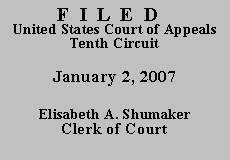

| GARY A. GRADY,
v.
AL ESTEP, Warden, L.C.F.;
ATTORNEY GENERAL OF THE
STATE OF COLORADO |
No. 06-1106
(D.C. No. 05-cv-2563-ZLW) (Colorado) |
In 2002, Mr. Grady pled guilty and was convicted of aggravated motor vehicle theft in Colorado's Jefferson County District Court. The court sentenced him to twenty-four years imprisonment and five years of mandatory parole. Mr. Grady subsequently filed for and was denied postconviction relief in state court. The Colorado Court of Appeals affirmed this decision and the Colorado Supreme Court denied certiorari. Mr. Grady then filed this 28 U.S.C. § 2254 petition, which the district court denied. He seeks a COA, asserting (a) the enhancement of his sentence based on prior convictions not incorporated into his plea agreement violated constitutional due process and jury trial guarantees, and (b) his counsel was ineffective for failing to object to the use of prior convictions in enhancing his sentence after those convictions were omitted from the plea agreement.
Under the Antiterrorism and Effective Death Penalty Act (AEDPA), a state habeas petitioner "has no absolute entitlement to appeal a district court's denial of his petition. 28 U.S.C. § 2253." Miller-El v. Cockrell, 537 U.S. 322, 335 (2003). Before he may appeal, he first must obtain a COA to provide the court of appeals jurisdiction. See id. at 336. A COA will issue only if petitioner makes "a substantial showing of the denial of a constitutional right." Slack v. McDaniel, 529 U.S. 473, 483 (2000) To do so, petitioner must show "that reasonable jurists could debate whether . . . the petition should have been resolved in a different manner or that the issues presented were adequate to deserve encouragement to proceed further." Id. (citations and internal quotation marks omitted).
In determining whether the petitioner has made the required showing, we review the claims presented in his § 2254 petition and generally assess their merit. See Miller-El, 537 U.S. at 336. In doing so, we "look to the District Court's application of AEDPA to petitioner's constitutional claims and ask whether that resolution was debatable amongst jurists of reason." Id. Where, as here, petitioner's federal habeas claims were adjudicated on the merits in state court, we will grant an application for a COA "only where the state court decision was 'contrary to, or involved an unreasonable application of , clearly established Federal law, as determined by the Supreme Court . . .' or was 'based on an unreasonable determination of the facts in light of the evidence presented in the State court proceeding.' 28 U.S.C. § 2254(d)." Dockins v. Hines, 374 F.3d 935, 936-37 (10th Cir. 2004).
As the district court noted, the Supreme Court held in Apprendi v. New Jersey, 530 U.S. 466 (2000), that "[o]ther than the fact of a prior conviction, any fact that increases the penalty for a crime beyond the prescribed statutory maximum must be submitted to a jury, and proved beyond a reasonable doubt." Id. at 490 (emphasis added). The state sentencing court's enhancement of Mr. Grady's sentence based upon his prior convictions was constitutionally permissible under Apprendi. That enhancement pertained to the sentence for the offense to which Mr. Grady pled guilty; it was not a sentence for the prior convictions, nor was it a sentence under the state statute for being an habitual offender. While the plea agreement obligated the state not to charge and convict Mr. Grady of being an habitual offender, it did not obligate the court to ignore prior convictions as an aggregating factor when it sentenced Mr. Grady for aggravated motor vehicle theft. Mr. Grady's ineffectiveness claim is similarly flawed because it is predicated on his attorney's failure to object on the same ground. Consequently, the district court's resolution of Mr. Grady's claims is not debatable among jurists of reason.
Turning to Mr. Grady's request for ifp status, we conclude he has failed to show "the existence of a reasoned, nonfrivolous argument on the law and facts in support of the issues raised on appeal." McIntosh v. U.S. Parole Comm'n, 115 F.3d 809, 812 (10th Cir. 1997).
For the aforementioned reasons, we DENY Mr. Grady's motion to proceed ifp, DENY his application for a COA, and DISMISS this appeal.
ENTERED FOR THE COURT
Stephanie K. Seymour
Circuit Judge
*.This order is not binding precedent, except under the doctrines of law of the case, res judicata, and collateral estoppel.
1.We liberally construe Mr. Grady's pro se application. See Cummings v. Evans, 161 F.3d 610, 613 (10th Cir. 1998), cert. denied, 526 U.S. 1052 (1999).
2.The district court denied Mr. Grady's request for a COA and motion to proceed in forma pauperis (ifp).